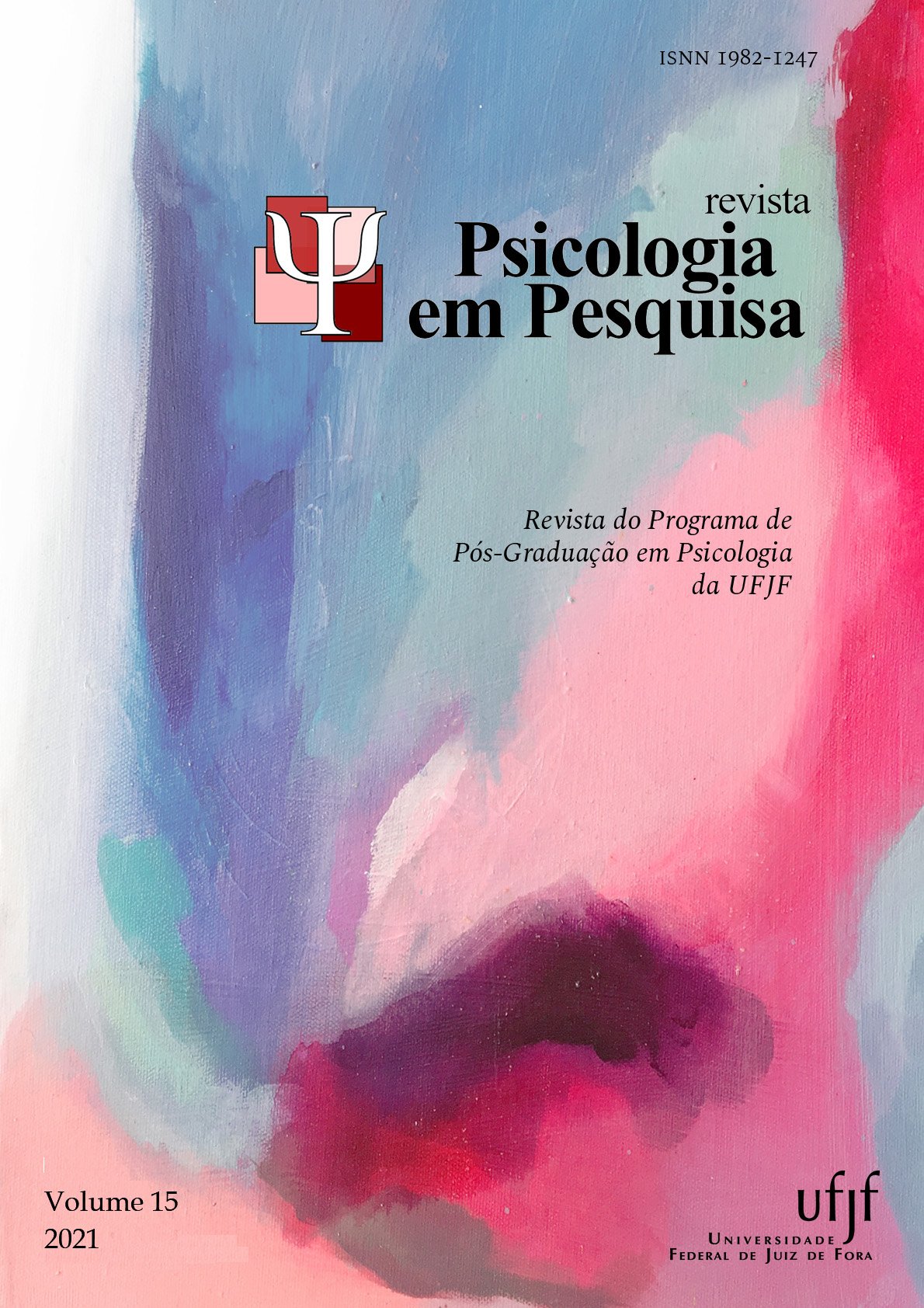State Mindfulness Scale for Physical Activity: further validity evidence
DOI:
https://doi.org/10.34019/1982-1247.2021.v15.30302Keywords:
Psychological assessment, Exercise, Sport psychology, Positive Psychology, MeasureAbstract
The aim of this study was to estimate validity evidence based on the relation with external variables
for the State Mindfulness Scale for Physical Activity. For this purpose, means comparison was
performed between groups of sports and yoga practitioners, as well as association analysis between
mindfulness and passion. The sample consisted of 85 people (29.16 ± 10.93), 58 were regular
practitioners of different sports, and 27 were yoga practitioners. Student’s t-tests indicated
meaningful differences between the groups, with higher mindfulness levels for yoga practitioners.
Pearson correlation indicated positive associations between mindfulness and harmonious passion
and absence of association with obsessive passion, confirming the theoretical hypothesis of
convergent and discriminant validity.
Downloads
References
American Educational Research Association (AERA), American Psychology Association (APA) & National Council on Measurement in Education (NCME). (2014). Standards for Educational and Psychological Testing. Washington, DC: American Educational Research Association.
Baltzell, A., Chipman, K., Hayden, L., & Bowman, C. (2015). Qualitative study of MMTS: coaches' experience. Journal of Multidisciplinary Research, 7(3), 5-16.
Bishop, S. R., Lau, M. A., Shapiro, S., Carlson, L., Anderson, N. D., & Carmody, J. (2004). Mindfulness: A proposes operation definition, Clinical Psychology Sciense and Practice, 9(3), 76-80. DOI: 10.1093/clipsy/bph077
Bureau, A. T., Blom, L. C., Bolin, J., & Nagelkirk, P. (2019). Passion for Exercise: Passion’s Relationship to General Fitness Indicators and Exercise Addiction. International journal of exercise science, 12(5), 122.
Chang, W. H., Chang, J. H., & Chen, L. H. (2017). Mindfulness enhances change in athlete’s well-being: the mediating role of basic psychological needs fulfillment. Mindfulness, 9(3), 815-823. doi 10.1007/s12671-017-0821-z
Cox, A., Ullrich-French, S., & French, B. (2016). Validity evidence for state mindfulness scale scores in a physical activity context. Measurement in Physical Education and Exercise Science, 20, 38-49.
Cox, A. E., Ullrich-French, S., Howe, H. S., & Cole, A. N. (2017). A pilot yoga physical education curriculum to promote positive body image. Body Image, 23, 1-8.
Dancey, C. P., & Reidy., J. (2006). Estatística sem matemática para Psicologia usando SPSS para Windows. Porto Alegre: ArtMed.
Field, A. (2009). Descobrindo a estatística usando o SPSS [recurso eletrônico]; tradução Lorí Viali. – 2. ed. – Dados eletrônicos. – Porto Alegre: Artmed, 2009.
Fragnani, S. G., de Sousa, A. S. K., Lopes, K. L., Nery, T., Wener, E., & Bezerra, P. P. (2016). Proposta de um programa de prática em grupo composto por fisioterapia, yoga e musicoterapia para pacientes com doença de Parkinson. Revista Brasileira de Neurologia, 52(3).
Gonçalves, M. P., & Belo, R. P. (2007). Ansiedade-traço competitiva: diferenças quanto ao gênero, faixa etária, experiência em competições e modalidade esportiva em jovens atletas. Psicologia-USF, 12(2), 301-307.
Jones, M. V. (2003). Controlling emotions in sport. The Sport Psychologist, 17, 471-486.
Light, R. L. (2018). Positive pedagogy for sports coaching: The influence of positive psychology. In: Brady, A., & Grenville-Cleave, B (Eds.). Positive Psychology in Sport and Physical Activity (pp. 193-203). Abingdon: Routledge.
Mañas, I., Águila, J. D., Franco, C., Gil, M. D., & Gil, C. (2014). Mindfulness y rendimiento deportivo. Psychology, Society, & Education, 6(1), 41-53. doi: 10.25115/psye.v6i1.507
Oliveira, A. V. R., & Padovani, R. C. (2018). Mindfulness e o esporte competitivo: a importância para atletas de alto rendimento. Revista Brasileira de Psicologia do Esporte, 8(2), 42-51.
Pasquali, L. (2007). Validade dos testes psicológicos: será possível reencontrar o caminho?. Psicologia: teoria e pesquisa, 23(SPE), 99-107.
Peixoto, E. M., Nakano, T. C., Castillo, R. A., Oliveira, L. P., & Balbinotti, M. A. A. (2019). Passion scale: Psychometric properties and invariance factor through Exploratory Structural Equation Modeling (ESEM). Paidéia (Ribeirão Preto), 29, e2911. doi: 10.1590/1982-4327e2911.
Peixoto, E. M., Palma, B. P., Torres, V. C. F., Silva, K. N. O., Farias, R. P., & Monteiro, V. T. L. (2019). Cross-cultural adaptation and validity evidence of the brazilian version of the state mindfulness scale for physical activity (SMS-PA). Journal of Physical Education and Sport. 19. 594-602.Primi, R. (2012). Psicometria: fundamentos matemáticos da teoria clássica dos testes. Avaliação Psicológica, 11(1), 297-307.
Pesca, A. D., Frischknecht, G., & PEIXOTO, E. M. (2019). Avaliação Psicológica no Contexto do Esporte. In: Baptista, M. N., Muniz, M., Reppold, C. T., Nunes, C. H. S. S., Carvalho, L. F., Primi, R., Noronha, A. P. P., Seabra, A. G., Wechsler, S. M., Hutz, C. S., & Pasquali L. (Org.). Compêndio de Avaliação Psicológica. (1ed., pp. 2010-221). Petrópolis: Editora Vozes.
Tanay, G., & Bernstein, A. (2013). State Mindfulness Scale (SMS): Development and initial validation. Psychological Assessment, 25, 1286–1299.
Thienot, E., Jackson, B., Dimmock, J. A., & Grove, R. (2013). Development and preliminary validation of the mindfulness inventory for sport. Psychology of Sport and Exercise, 15(1), 72-80.
Ullrich- French, S., Hernández, J., & Montesinos, M. D. H. (2017). Validity evidence for the adaptation of the State Mindfulness Scale for Physical Activity (SMS-PA) in Spanish youth. Psicothema, 29(1), 119-125.
Vallerand, R. J., & Blanchard, C. M. (2000). The study of emotion in sport and exercise. In: Hanin, Y. L. Emotions in sport (pp. 03-37). Champaing: Human Kinetics.
Vallerand, R. J., Blanchard, C., Mageau, G. A., Koestner, R., Ratelle, C., Léonard, M., Gagné, M., & Marsolais, J. (2003). Les passions de l’aîme: On obsessive and harmonious passion. Journal of Personality and Social Psychology, 85(4), 756- 767. doi: 10.1037/0022-3514.85.4.756
Vallerand, R.J., & Verner-Filion, J. (2020). Theory and research in passion for sport and exercise. In: G. Tenenbaum & R. Eklund (Eds.) Handbook of Sport Psychology (4th Edition). New York: Wiley.
Vallerand, R.J. (2010). On passion for life activities: The dualistic model of passion. Advances in Experimental Social Psychology, 42, 97–193. doi:10.1016/s0065-2601(10)42003-1
Vallerand, R.J. (2015). The psychology of passion: A dualistic model. New York, NY: Oxford University Press.
Weinberg, R. S.; Gould, D. (2017). Fundamentos da Psicologia do Esporte e do Exercício (6ª Edição). Porto Alegre: Artmed.
Zeng, H. Z. (2003). The difference between anxiety and self-confidence between team and individual sports college varsity athletes. International Sports Journal,13(4), 28-34.















